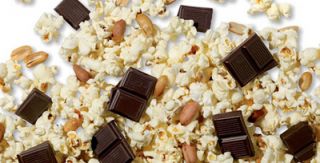
Diet
How to Avoid the Afternoon Munchies
The real reason you crash every afternoon
Posted August 8, 2013

Last time I shared why we get the afternoon munchies. This week we’re going to discuss how to avoid them.
But let’s get back to our problem, first. It’s 3:00 pm and you’re starving. You can have a piece of birthday cake (300 calories) or 2 sticks of chicken satay with peanut dip (268 calories). Guess which one is going to signal your body that you’re full and keep you full longer? Hint: it’s not the birthday cake. You could even have a 150 calorie strawberry almond milk smoothie (so half the calories of the cake) and you’d still be more satisfied than with that piece of birthday cake. Why? It all has to do with the nutrient density of that snack. What’s in a piece of birthday cake? Flour. Sugar. Maybe a tiny bit of egg. None of that is going to sustain you for very long. But talk about lean meats (chicken breast), nuts, or even fruit (strawberries) and nut milk, and now you’ve got something that will last you until dinner.
Why? It all comes down to nutrient density. Foods come in a variety of different “densities.” A nutrient dense food is a food that has a high amount of nutrients with low calories (food energy). An energy dense, or empty calorie, food is a food that has a lot of calories but little or no nutrients. Examples of nutrient-dense foods include carrot sticks, chicken satay, skim milk, and whole grain bread. All of these foods will provide nutrients that will help fuel the body, and also make a person feel full for longer periods of time. Empty calorie foods would include anything highly processed, such as potato chips, soda, fast food, or birthday cake. These foods will have many more calories than nutrient-dense foods, and they are satisfying for only a short period of time. With empty-calorie foods, you will feel hungry in a shorter amount of time than if you ate nutrient-dense foods.
While there are many factors that lead to obesity, one of the main problems centers around people’s food choices. Let’s take my client Jennifer. In an effort to cut calories, she rarely ate breakfast. Occasionally she would have a flavored cereal – so, highly processed grains and sugar -- around 10:00 am. Around 2:00 pm or 3:00 pm, she’d eat more highly processed grains and processed meats in the form of a sandwich or she would have a frozen dinner - and who knows what’s in that?! If she got hungry in between meals, she’d have a high caffeine and/or high sugar soda or pink lemonade with some processed, high fat chips and salsa – yay, some veggies! By the time dinner came around, she’d be ravenous and eat Fettuccine Alfredo -- processed grains, lots of high fat cheese -- or a burger -- processed, high fat meat, processed grains – and that was her “healthiest” meal of the day!
But here’s the rub: even with all that processed food, Jennifer wasn’t eating all that many calories – well below what her 320 pound frame would have required to maintain its weight – yet she was continually struggling with weight loss. Despite her calorie restriction, she wasn’t losing any weight. Why? Because the food choices she was making were not being recognized by her body as actual food – there were so few nutrients left in what she was eating, that she never felt full. To go back to our biology, no matter what she ate, her ghrelin production never shut off. Because what Jennifer was eating consisted of either high sugar or high fat foods, neither of which help to suppress ghrelin production. She was always hungry, yet paradoxically always struggling with her weight. To further compound the problem, she never got full because the hormone that signals our brain that it’s time to stop eating (CCK) is best stimulated by foods containing fat and protein, not carbohydrates.
So, back to our original question: How do you avoid the afternoon munchies? Two tips: 1) Don’t diet: one of the top reasons people fail on “diets” is because they’re hungry. All the time. What we’ve learned from the research is that if you are on a diet, you need to be very conscious not only of the calorie content of what you are eating, but also the actual nutrient density of the meal. While eating a 300 calorie piece of birthday cake every once in a while won’t derail your diet, if you’re going to restrict calories, you’d be much better if those calories are nutrient dense. 2) Eat real food: hint: if it comes in a package, it’s not real food. By real food I’m talking about whole grains, fruits, veggies, legumes. Why? Your body was designed to function on real food. As we’ve already discussed, if you eat a highly processed diet, your body may not recognize what you’re eating as food and thus you never get full. However, if you strive to eat several small meals a day consisting of whole grains, fruits, veggies, nuts, legumes, etc., your body will get full on fewer calories because those calories will be calorically dense. As a result, if you’ve eat a few good meals by 3:00pm, the afternoon munchies will never strike.
Next week: A food psychologist’s take on the Paleo Diet

